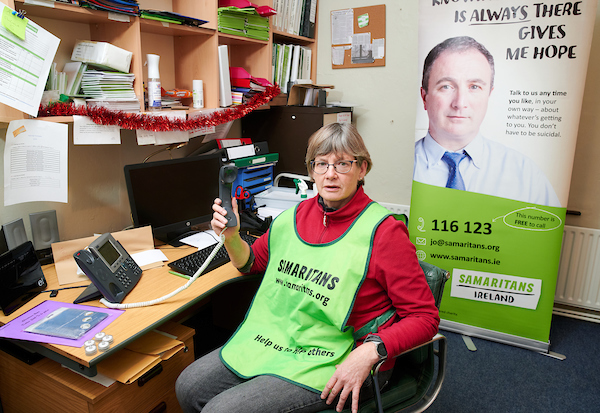ALMOST two years of restrictions helped stem the march of Covid-19, but it undoubtedly came at a cost to many people’s emotional and mental wellbeing.
Loneliness was always one of the main reasons that people picked up the phone and rang the Samaritans, and with interaction virtually banned at certain times and severely restricted at all others, it was far worse than ever between March 2020 and January 2022.
Margaret McMahon is director the Clare & Ennis branch of the Samaritans and on Monday, she said the pandemic had resulted in more callers.
“I think we got more callers and they were coming from a wider range of backgrounds. We would have had students who were not back at home, young people who would have been staying away and there are all the pressures that come with that in a family.”
“Particularly in the beginning there would have been people who were trying to keep a long distance relationship together. You had people who had lost their jobs or were afraid of losing their jobs. We had people who were so nervous about going out and we were the people they were talking to.
“Then you had the people we always had, and the supports for people with mental health difficulties and for people on their own were all closed. Day Centres, all those things were closed and that was very challenging for people, it really was.”
Since March of 2020 there have been numerous changes to regulations, and each time it ratched up some people’s anxiety levels.
“When there was a change or something happening, there would be calls about that. We’ve had calls over the last few days from people who are nervous about the reopenng as well.
“There have been calls from people who were asked to meet their friends, and they didn’t want upset them, but they felt uncomfortable. There are people in work situations, particularly at the beginning, who felt very nervous about going into work. There has been all of that.”
Even when people weren’t talking explicitly about Covid, they were often talking about issues that arisen due to it.
“It has been in the background of an awful lot of calls, it added another layer to it, made it just that bit more challenging. If you can’t go out, and relationships in a house were challenging, it made it that more difficult.”
Broadly speaking the public mood is more positive and optimistic as a result of the relaxation of most of the restrictions, but Margaret says that some people calling the Samaritans are quite anxious about it, and feel it’ll take time to adjust.
Apart from the callers concerns, Margaret says that keeping the branch open and operating safely has not been easy.
“It was very challenging to fill rotas. You had people who were close contacts and you’d have to close shifts at short notice so it was hard to keep the branch open. Just to pay tribute to the volunteers, people were so flexible and they changed to try and fill shifts, a lot of people took on extra roles to make sure we stayed open.”
Some volunteers had the same concerns as some of the callers, but they still turned up and kept the show on the road.
“Volunteers may have been nervous themselves, but they’d come into the centre because they’d see the need for it.”
Loneliness was a sizeable problem in society before the pandemic, which was exacerbated by years of restrictions and she feels that people need to be conscious of it.
“Just for all of us, even saying hello to someone can make a big difference in their day. These kind of little things that we can all do.”
Owen Ryan has been a journalist with the Clare Champion since 2007, having previously worked with a number of other publications in Limerick, Cork and Galway. His first book will be published in December 2024.


